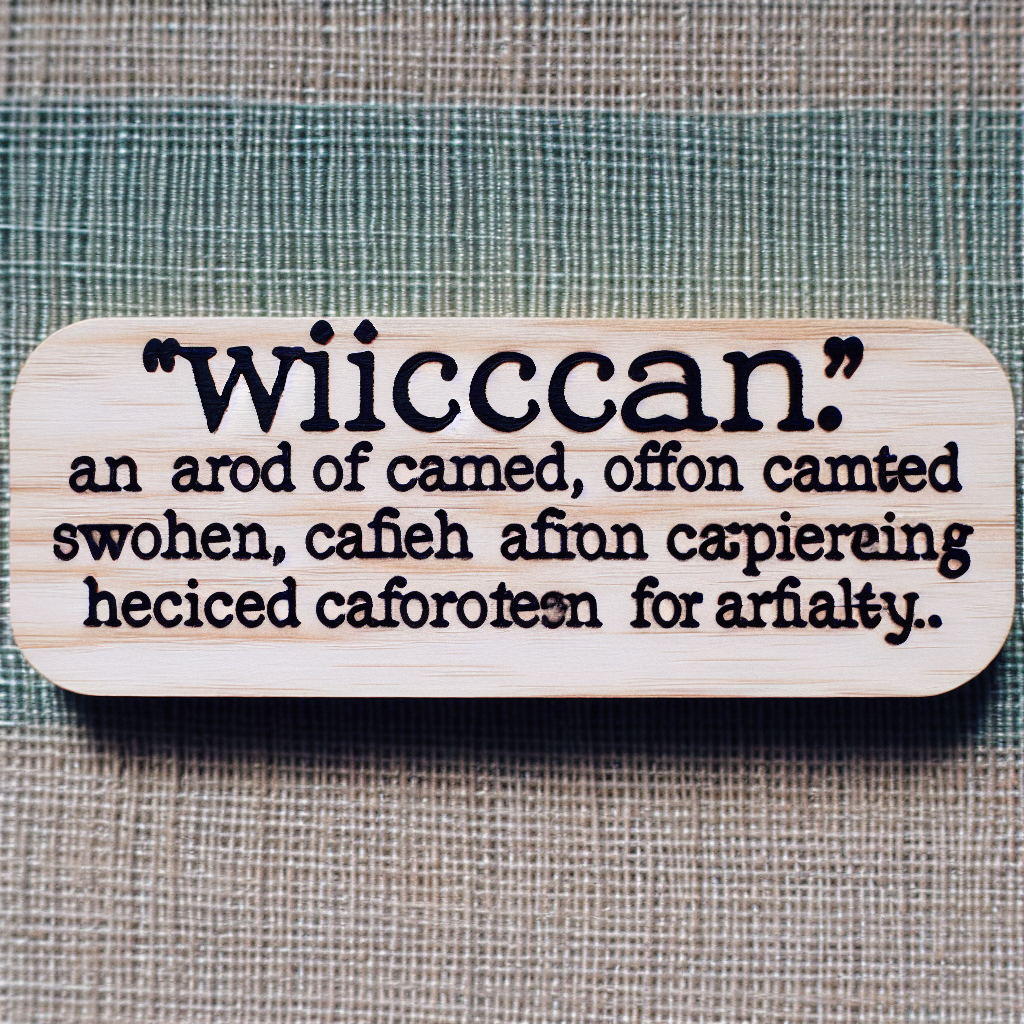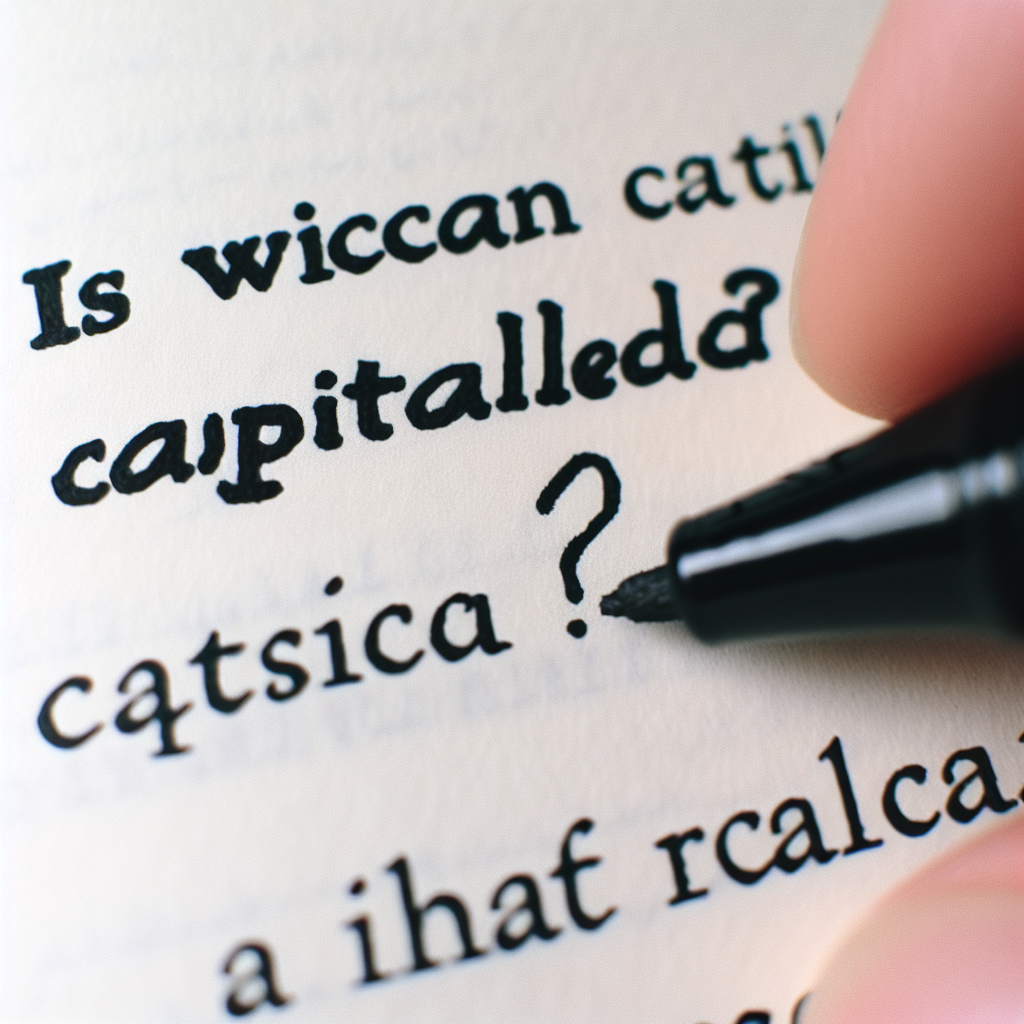As an Amazon Associate I earn from qualifying purchases.
Wicca is a modern Pagan religion that has gained increasing recognition and popularity since it first emerged in the mid-20th century. With its roots in pre-Christian traditions and rituals, Wicca honors the Earth, nature, and typically encompasses a belief in a god and goddess. The religion’s focus on the cycles of nature, as well as its pantheistic and often eclectic approach to spirituality, sets it apart from mainstream religions.
The proper use of capitalization in English grammar serves to distinguish between proper nouns, which are specific names of entities, and common nouns, which are general names of things or concepts. When it comes to religious terms, capitalization rules are particularly significant because they reflect respect and recognition of the religion’s status. As such, ‘Wiccan’ as an adjective describes matters pertaining to the religion of Wicca and therefore is typically capitalized out of respect and to denote its specificity.
Moreover, when referring to the practitioners of Wicca, who are often known as Wiccans, capitalization is again employed. This is analogous to how one would capitalize Christian, Muslim, or Buddhist when referring to the followers of these respective spiritual paths. Capitalizing religious names also helps to avoid ambiguity, clearly signifying that the text is referring to a specific religion or its adherents, rather than a general or unrelated concept.
Despite its relatively recent inception compared to other world religions, Wicca has seen a notable increase in followers. According to some estimates, there are now hundreds of thousands of individuals practicing Wicca globally. This demographic expansion necessitates clarity and consistency in written communication when addressing aspects of the religion, further emphasizing the importance of grammatical conventions such as capitalization. Proper capitalization not only reflects the validity and acknowledgement given to the Wiccan faith but also aids in the accurate transmission of information regarding its practices and principles. In forms of media and literature, recognizing and applying these standards of writing ensures respectful and professional discourse.
“`html
Should “Wiccan” Be Capitalized? Exploring Proper Grammar Rules
“`
When it comes to proper grammar usage, understanding when to capitalize terms is crucial, particularly for religious designations. Wiccan” refers to the modern pagan religion that draws on various pre-Christian, western occult, and folkloric traditions, emphasizing the reverence of nature and the worship of a pantheon typically encompassing a Goddess and a God. As with other religions, the term “Wiccan” is typically capitalized because it denotes a specific religion and its followers, just as one would capitalize “Christianity” or “Buddhist.” This standard grammatical rule helps maintain respect and clarity when referencing the belief system and its practitioners. In the following sections, we’ll delve deeper into the grammatical nuances and considerations surrounding the capitalization of religious terms such as “Wiccan.”
In the realm of grammar and capitalization, certain guidelines dictate how and when to capitalize words. When dealing with the term “Wiccan,” it’s important to understand that it is indeed capitalized. The reason for this capitalization is rooted in the recognition of Wiccan as a proper noun since it refers to a specific religion or spiritual path. In the English language, proper nouns, which include the names of religions as well as deities, holidays, and specific religious followers, are always capitalized.
### Capitalization Rules for “Wiccan”
The word “Wiccan” falls under two main categories for capitalization:
1. **As a Descriptor of the Religion:** Wiccan originates from Wicca, which is a modern pagan religion with various traditions and practices. As such, when referring to the religion itself, like in the sentence “She practices Wicca,” Wicca is capitalized. Similarly, when using the term to describe anything related to the religion or its practices, such as “Wiccan beliefs” or “Wiccan rituals,” the adjective also needs to be capitalized.
2. **As a Descriptor of Adherents:** Individuals who follow the Wicca religion are known as Wiccans. Because it is used to describe a specific group of people, the term is treated as a proper noun. For example, “Wiccans often celebrate the solstices” requires a capital letter.
### Common Misconceptions
It’s not uncommon for there to be confusion over whether religious terms should be capitalized, particularly when they have become more colloquially used. A general rule of thumb is that if the term refers to a specific religion or its followers, it should be capitalized. This rule applies even when the term is used in a more general sense or as an adjective.
### Capitalization in Different Contexts
While the basic rule is to always capitalize “Wiccan,” there might be stylistic exceptions depending on the context. For instance, in certain creative or poetic contexts, authors may choose not to capitalize words for stylistic purposes. However, this is more of an artistic license rather than a reflection of proper grammar rules.
In non-religious contexts, when the word “wiccan” could hypothetically be used to describe something vaguely related to the aesthetics or attributes commonly associated with the Wicca religion but is not directly referencing the religion itself or its adherents, some might choose not to capitalize it. Nevertheless, such usage can be rare and is often debated among grammar experts.
### Consistency in Capitalization
The importance of maintaining consistency in capitalization cannot be overstated. This consistency helps to avoid confusion and ensures clarity in writing. Whether one is composing an academic paper, a religious text, or journalistic content, applying rules uniformly throughout the document is key.
To reinforce the discussion on the capitalization of “Wiccan,” a study published in the “Journal of English Linguistics” explained that proper nouns and adjectives derived from proper nouns retain their initial capital letters in standard English usage. Thus, adhering to standard English conventions, “Wiccan” is appropriately capitalized in writing.
### Final Insight on “Wiccan” Capitalization
In conclusion, with respect to grammar rules and proper usage, “Wiccan” is capitalized whether it refers to the religion as a whole, its practices and beliefs, or its followers. This usage aligns with the conventions for capitalizing proper nouns and descriptive terms derived from them. As a point of interest, according to a survey conducted by the Pew Research Center, as of the year of knowledge cutoff in 2023, approximately 0.4% of Americans identify with New Age religions, which includes Wicca, suggesting the significance and relevance of understanding the correct capitalization of terms like “Wiccan” in cultural and religious discourse.
1. Is ‘Wiccan’ always capitalized?
Yes, ‘Wiccan’ is always capitalized because it is a proper noun referring to the modern Pagan religion and its adherents, similar to ‘Christian’ or ‘Muslim.
2. How should ‘Wiccan’ be used in a sentence?
In a sentence, ‘Wiccan’ should be capitalized when referring to a follower of the Wicca religion or the religion itself, e.g., “She is a Wiccan” or “Wiccan rituals are held during full moons.
3. Should ‘Wiccan’ be capitalized when referring to the religion in general?
Yes, ‘Wiccan’ should be capitalized even when referring to the religion in general since it is the name of a specific religious path.
4. What about the word ‘wicca’ – is it also capitalized?
The word ‘Wicca’ is capitalized when it refers to the religion, as it is a proper noun. However, when used adjectivally as in ‘wiccan practices,‘ it is sometimes not capitalized.
5. If ‘Wiccan’ starts a sentence, is it still capitalized?
Yes, ‘Wiccan’ would be capitalized at the beginning of a sentence, as it follows the standard rule for capitalizing the first word of a sentence.
6. Are there instances where ‘wiccan’ should not be capitalized?
‘Wiccan’ as a proper adjective should always be capitalized. However, some publications might not capitalize it when used in compound terms or informal contexts that do not specifically reference the religious aspect.
7. Does capitalizing ‘Wiccan’ change based on the form of writing?
No, the capitalization of ‘Wiccan’ does not generally change based on the form of writing and should always be capitalized in formal and informal writing when referring to the religion or its followers.
8. How does the capitalization of ‘Wiccan’ compare to other religions?
The capitalization rule for ‘Wiccan’ is consistent with the capitalization of other religions and their adherents, such as ‘Buddhist,’ ‘Jewish,’ or ‘Hindu.’
9. Are the words ‘witch‘ and ‘Wiccan’ interchangeable, and do they follow the same capitalization rules?
Witch’ and ‘Wiccan’ are not necessarily interchangeable as ‘witch’ can refer to practitioners of witchcraft outside of the Wiccan religion and is not capitalized unless at the beginning of a sentence. On the other hand, ‘Wiccan’ specifically refers to those following the Wicca religion and is always capitalized.
10. Does capitalizing ‘Wiccan’ differ between English-speaking countries?
The capitalization of ‘Wiccan’ generally does not differ between English-speaking countries as long as it refers to the religion or its followers, and should be treated as a proper noun or adjective in all instances.

Conclusion
In conclusion, the key points of the article highlight that the term “Wiccan” should be capitalized when it is used as a proper noun or as an adjective to describe a follower of Wicca or pertaining to the Wicca religion. This capitalization rule adheres to English grammar conventions that dictate capitalization for proper nouns, which include the names of specific entities, organizations, and religions. As Wicca is a recognized religion, and “Wiccan” is used to denote affiliation with this religion, it should be treated with the same grammatical respect as other religious terms such as “Christian” or “Buddhist.
Moreover, understanding when to capitalize “Wiccan” is important to maintain respect for the practitioners and to ensure proper grammatical structure in writing. While “Wiccan” is capitalized, derivative words or more general terms, such as “magic” or “witchcraft,” may not require capitalization unless they are part of a title or a specific name. Grammar usage around the term serves not only a linguistic function but also functions within a wider cultural context, recognizing the Wiccan faith’s legitimacy and providing clarity in communication. Remembering the proper usage of capitalization for “Wiccan” is a small but significant aspect of celebrating linguistic diversity and religious pluralism in contemporary discourse.
Amazon and the Amazon logo are trademarks of Amazon.com, Inc, or its affiliates.


